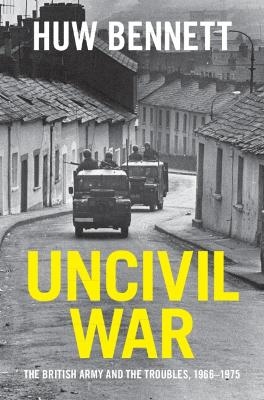
Uncivil War
The British Army and the Troubles, 1966–1975
Seiten
2023
Cambridge University Press (Verlag)
978-1-107-13638-0 (ISBN)
Cambridge University Press (Verlag)
978-1-107-13638-0 (ISBN)
When Operation Banner was launched in 1969 civil war threatened to break out in Northern Ireland and spread over the Irish sea. Uncivil War reveals the full story of how the British army acted to save Great Britain from disaster but, in so doing, condemned the people of Northern Ireland to protracted, grinding conflict.
When Operation Banner was launched in 1969 civil war threatened to break out in Northern Ireland and spread over the Irish Sea. Uncivil War reveals the full story of how the British army acted to save Great Britain from disaster during the most violent phase of the Troubles but, in so doing, condemned the people of Northern Ireland to protracted, grinding conflict. Huw Bennett shows how the army's ambivalent response to loyalist violence undermined the prospects for peace and heightened Catholic distrust in the state. British strategy consistently underestimated community defence as a reason for people joining or supporting the IRA whilst senior commanders allowed the army to turn in on itself, hardening soldiers to the suffering of ordinary people. By 1975 military strategists considered the conflict unresolvable: the army could not convince Catholics or Protestants that it was there to protect them and settled instead for an unending war.
When Operation Banner was launched in 1969 civil war threatened to break out in Northern Ireland and spread over the Irish Sea. Uncivil War reveals the full story of how the British army acted to save Great Britain from disaster during the most violent phase of the Troubles but, in so doing, condemned the people of Northern Ireland to protracted, grinding conflict. Huw Bennett shows how the army's ambivalent response to loyalist violence undermined the prospects for peace and heightened Catholic distrust in the state. British strategy consistently underestimated community defence as a reason for people joining or supporting the IRA whilst senior commanders allowed the army to turn in on itself, hardening soldiers to the suffering of ordinary people. By 1975 military strategists considered the conflict unresolvable: the army could not convince Catholics or Protestants that it was there to protect them and settled instead for an unending war.
Huw Bennett teaches International Relations at Cardiff University. He is the author of Fighting the Mau Mau: The British Army and Counter-Insurgency in the Kenya Emergency (2012).
Introduction; 1. Baggage; 2. The army's short-lived Ulster honeymoon; 3. Escalation and the erosion of impartiality; 4. Edward Heath's bid for victory; 5. The road to Bloody Sunday; 6. The most deadly year; 7. Strategy in the shadow of loyalist power; 8. We cannot envisage peace; Conclusion; A note on sources.
| Erscheinungsdatum | 06.10.2023 |
|---|---|
| Reihe/Serie | Cambridge Military Histories |
| Verlagsort | Cambridge |
| Sprache | englisch |
| Maße | 159 x 236 mm |
| Gewicht | 760 g |
| Themenwelt | Geschichte ► Teilgebiete der Geschichte ► Militärgeschichte |
| ISBN-10 | 1-107-13638-5 / 1107136385 |
| ISBN-13 | 978-1-107-13638-0 / 9781107136380 |
| Zustand | Neuware |
| Haben Sie eine Frage zum Produkt? |
Mehr entdecken
aus dem Bereich
aus dem Bereich
neueste Manipulationstechniken als Waffengattung der NATO
Buch | Softcover (2023)
Westend (Verlag)
24,00 €
Deutschlands Schwäche in der Zeitenwende
Buch | Softcover (2023)
C.H.Beck (Verlag)
18,00 €


